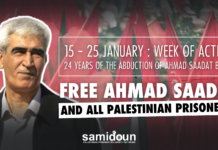 The High Follow-Up Committee for Arab Citizens of Israel in Palestine ’48 expressed its solidarity with its member, Mohammed Kana’aneh of the Abnaa el-Balad Movement, imprisoned in Shatta prison and currently in an open hunger strike for over 1 week to struggle for dignity, human rights and to protest the fascist practices of the prison administration.
The High Follow-Up Committee for Arab Citizens of Israel in Palestine ’48 expressed its solidarity with its member, Mohammed Kana’aneh of the Abnaa el-Balad Movement, imprisoned in Shatta prison and currently in an open hunger strike for over 1 week to struggle for dignity, human rights and to protest the fascist practices of the prison administration.
The committee denounced the prison administration’s targeting of Kana’aneh, including placing him with Israeli criminal prisoners while at the same time placing on him all of the restrictions of a ‘security’ prisoner, and refusing to transfer him to Gilboa prison with other Palestinian political prisoners.
The prison administration has escalated its retaliatory actions against Kana’aneh during his hunger strike, confiscating the contents of his cell and denying him visits.
The committee called for a protest in front of the priosn in solidarity with Mohammed Kana’aneh and with the other brave prisoners who have engaged in hunger strikes, including the ongoing strikes of Ayman Sharawna and Samer al-Issawi.
He is currently imprisoned for 15 months for organizing in the occupied Syrian Golan Heights to comemmorate the Naksah on June 5, 2011. He was held in Tzalmon Prison since April; in October he was transferred to Shata prison, where he is being housed with criminal Israeli prisoners rather than with Palestinian political prisoners. Kana’aneh said that the prison administration deals with him as a ‘security prisoner’ when denying him the rights accorded to criminal prisoners, but houses him with criminal prisoners rather than other ‘security prisoners’.
Kana’aneh has served many years in Israeli jails and sees this treatment as deliberate retaliation for his political activity. The Abna’a el-Balad Movement stated that “we recognize that the inhumane practices and restrictions against Comrade Mohammed Kana’aneh come as part of the practice of political persecution by state institutions against him and members of the Abnaa el-Balad movement in particular, and against all of the political leaders and activists of the masses of our people. We demand an end to these practices and the achievement of Kana’aneh’s just and basic demands, and we call upon the leadership of our people to take the necessary steps to struggle to achieve those demands.”
Discover more from Samidoun: Palestinian Prisoner Solidarity Network
Subscribe to get the latest posts sent to your email.




